- Home
- Jane Lebak
The Boys Upstairs (Father Jay Book 2) Page 2
The Boys Upstairs (Father Jay Book 2) Read online
Page 2
“Apparently saved his life and kept him from spending eighty years in the lockup.”
“Sent him to the poorest inner-city church there is.” Kevin looked out the side window. “He's wasting his life.”
“That's why you went from being his shadow to not talking to him more than twice a year?”
“It's awful to see what my own brother's doing to himself. And all for a lie.”
When Bill didn't respond, Kevin looked back at him. “This world is a nasty place that doesn't give anyone any second chances. I told you what happened to my mother. Some drunk driver comes out of nowhere, and there's no second chance for her. How many times have we found kids who tried to smoke the latest thing for the first time and ended up dead? No second chance for them either. People made up God so they'd have someone else to blame for all the random garbage life throws their way. Then they could say they'd have a second chance in the next world. And my brother bought right into it when life threw garbage at him. Sorry. It doesn't hold any water for me.”
Bill didn't look at all disturbed. “I suppose I shouldn't tell you I believe in God, then?”
“Believe what you like, man.” Kevin nodded toward the expensive sports number in front of them. “Hey, have you noticed how that car keeps bucking, like the guy hasn't ever driven a stick-shift before?”
“You mean the Audi TT I've been tailing for the last half-mile? Yeah, I think it's time we pull him over and find out it's stolen. Hit the lights.”
Holly Mayfield came into her dark kitchenette to find the answering machine blinking. It was so old that the triangle had worn off the 'play' button. While the tape whined on the spools, she removed her coat and gloves, set her hat on the tabletop, and glanced at the microwave. One o'clock in the morning. Her shift hadn't been as bad tonight as it could have been. At least there hadn't been any customers entering the restaurant ten minutes before closing asking to be seated and served a full dinner. On the other hand, three tables had only tipped her a dollar each on their tickets, and she'd had one walk-out.
Her mother was on the message machine, reminding her that Aunt Mary's birthday was next week, and that she should send a card. The other message was Father Jay, asking if she had any extra blankets or pillows because he'd just acquired three additional children.
“You know,” Holly said to herself as she walked into the living room, “some people collect normal things, like stamps or coins. You collect kids.”
She happened to have two beat-up old pillows in a closet for when her brother came to town. They used to be her “real” pillows, but last year they'd finally gotten flatter than the inside of a band-aid, and she'd retired them. Her brother put both in the same pillowcase, declaring it fine because together they about made one pillow. She hoped the kids wouldn't mind, since the alternative was nothing. Did Father Jay even have pillowcases for them? Probably not. She sighed.
She had one extra blanket, again the one she saved for her brother. Her brother wouldn't be visiting this Christmas, so she could send it over to the rectory too. She used an old throw when she watched TV, but now that the restaurant had her working night shifts she didn't watch much, so that could go. The third kid—well, God had better provide, because she couldn't.
It scared her that Father Jay had called for help. When he reached for the phone, it meant he had his back to the wall. Saying there were no pillows and blankets left at the rectory meant he was sleeping with his head on a folded t-shirt and the rest of him under his winter coat.
Ah, now if only he had a brother...I mean, a brother I could date. Holly hung her coat in the hall closet, and set her purse on the hook, and then slipped out of her shoes and left them in front of the shoe rack. God, you've got to do something about Kevin. After Jay's introduction during a church get-together last year, she had gone on two dates with Kevin. He had Jay's bearing in a way Holly imagined Jay would have if he hadn't gotten injured, although more handsome than Jay, more muscular and more apt to laugh at her silly jokes. Kevin and Jay shared a tendency to suddenly satirize a familiar song, but neither could carry a tune. Kevin could make her laugh. Unfortunately, Kevin had such an open hostility toward religion that Holly declined a third invitation to go out with him. It was a shame.
In the bedroom, Holly pulled free her hair clip, then dumped all the change and crumpled bills from her pockets onto her dresser. It made a nice pile. She could pretend it contained treasure that would leave her comfortably shopping for groceries and then taking a trip to the mall for lavish Christmas presents for her family. In reality, it was always just enough to keep her squeaking by. She counted herself lucky that a fifteen percent tip at this restaurant was a living wage. At the last one, customers tipped on smaller checks, so for the same number of trips to the tables, she ended up taking home far less.
She stacked the coins, sorted the bills, totaled it out, and wrote the amount in her notebook. Before going to bed she managed to make a roll of dimes and two rolls of pennies. The quarters she kept in a mayonnaise jar for doing laundry. While rolling coins, she prayed, Dear God, thank you for a good night tonight. Thank you for letting me get out of there before two o'clock in the morning. And please be sure to bless that nice couple who tipped me twenty bucks. I didn't even really do anything special for them.
Her mouth twitched. And I guess I'm supposed to pray for that jerk who commented about how I looked in my uniform and then ended up tipping me a dollar when I refused to go out with him. I dunno—maybe you could give him a conscience or something? She grinned. At the very least, please take care of Father Jay and those boys he keeps upstairs. He has no idea what he's in for with all of them, has he?
Kevin opened his locker to retrieve his duffle bag. The heavy belt weighted down his waist, but he didn't remove it. He took off first his shirt, then his bullet-proof vest, then replaced his shirt, and grabbed his jacket.
Christmas songs. Christmas lights. Christmas trees. Only a little longer until the gifts were exchanged (both with one another and at the stores) and the trees went to the curbside. The songs would play for a few more days, and then it would be over. Red and pink would go up for Valentine's Day, and the world would go back to normal. Christmas was only one day, but it had expanded to fill an entire sixth of the year.
Two years ago, Kevin had been joking with his then-partner in the patrol car when they'd gotten a call for a domestic. Routine for Christmas Eve—unfortunately, domestic violence rocketed around town like Santa on his sleigh at Christmas time. Always disgusting, but the character of the holiday threw the violence into sharper relief. Men beating their wives because they'd cooked the turkey wrong: joy to the world.
Kevin and his partner had just finished up when they got a call about a car accident. They responded with sirens screaming, racing down the centerline of the boulevard as cars dived to the curbs. He arrived to find two cars mangled together like lovers shot by a jealous husband. A Ford Taurus on its back, the side caved in, and a Camry impacted so hard on the driver's side it was bent like an L. A third sedan, make and model unidentifiable, had its engine in the front seat, smashed head-on into a wall.
Running through the glass shards that crunched like ice beneath his steel-toed shoes, Kevin went to the Camry and shone his flashlight through the shatter-frosted window to see there was no way to help this woman. His partner checked the flipped Taurus, and again, nothing.
Kevin would have bet the house drugs were involved. Instead, the autopsy results came back clean. Just a driver racing to the mall.
Jobs that should never be done: calling the coroner on Christmas Eve. More than that: being the one to contact a dead driver's family the night before Christmas. He'd managed to secure the contents of one car for the family so they'd have at least this final Christmas gift.
Such a senseless crash, an act of stupid haste and three lives snuffed like a smoldering candle. Kevin would remember forever crunching up two icy steps on a wooden porch entwined with blinking white lights, a push of the
doorbell, and the terror flashing across a middle-aged woman's face as she opened the door to a police officer. “Are you Mrs. Sherry Daniels?”
What more do you say after that? How do you make the unbearable able to be borne?
Next November, Kevin recoiled the first time he saw porches adorned with blinking white lights. It took two weeks to figure out why. He went to the Daniels family's house on Christmas Eve that year—no blinking lights, not then—carrying a plant and a sympathy card. They weren't home, so Kevin left them on the steps. This year he wouldn't go at all. He'd mentally kicked himself over and over for not considering the mother's reaction if she'd been there, if she'd seen him on a second Christmas Eve.
He never came to bring glad tidings of great joy, that's for sure. That was why everyone in the city either hated the cops or feared them. Kevin looked at himself in the mirror some mornings and thought, That's me. Someone to be hated and feared.
As he put his cap back into his locker, Kevin caught sight of the metal inside the brim, or rather the medal. Jay had given it to him when he'd entered the police academy, insisted he pin it somewhere on the uniform, and a lot of cops had the same one. A medal of Saint Michael. Kevin knew from the wings that Michael was an angel, not why he would be the patron of police officers. Do you ever manage to do any good, he thought to the angel figure, or does everyone hate and fear you too?
That was something Jay maybe understood, if Kevin ever felt like asking. Although Kevin couldn't say for certain, he figured priests too must be hated and feared. Feared as if they were judges or magicians, hated because they represented the Church and everything it stood for in the minds of everyone on Earth. Like the police, priests were meant to be trusted, access to a law higher than the citizenry, and so often unable to enforce a damned thing. Jay couldn't stop a man from sinning, and Kevin couldn't stop a young woman from dying on Christmas Eve.
He slammed his locker and sighed.
One of the other guys looked up. “Long night?”
“I hate Christmas.”
“Ho ho ho. Merry paperwork.” The guy laughed, but Kevin only left the locker room to head for home.
Half an hour driving, listening to talk radio in his car, and watching the digital clock during light cycles. Once home, he locked away his gun and set aside his uniform. In front of the TV he flipped channels until he found a movie with lots of explosions, then left it running in the background as he changed into flannel pajama pants and grabbed a bag of chips. The recliner creaked as he settled himself. He checked his voicemail, one message.
Dad's scratchy voice. “I didn’t want to call later, in case you're sleeping.”
Kevin rolled his eyes. I'm on a night tour, Dad—figure it out.
“I wasn't sure what your off days would be for the rest of the week. They've got a full schedule for Christmas Eve and Christmas Day, so I may not be able to catch you over the holiday. If I don't get a chance to talk to you, have a merry Christmas.”
“You too,” Kevin said to the voicemail. “You and five hundred other retirees in a gated Florida community.” He leaned back in front of the TV set. “Don't do anything I wouldn't do.”
The movie was boring, loud, and predictable. Kevin woke up an hour later to find it had already ended. He shut off the set and dragged himself to bed. Two more days until Christmas.
Three
Divine providence didn't have to alert Jay when the trio of newcomers tried to escape. The old rectory creaked with as many different tones as a symphony orchestra, and having been an escape artist himself as a teen, Jay knew what to expect.
And so it was that when Louis, Maria and Jamie got to the front door, one stuffed-full pillowcase in Maria's arms and Jamie in Louis's, Jay met them there.
“It's really too cold to leave in the middle of the night.” He gestured toward the parlor as the three children clustered together in fear. “I'd never spank you, and I know I can't keep you if you're determined to go. But if you have to leave, you might as well leave in the morning.”
The kids shuffled into the parlor alongside the front entrance, and Jay turned on the lights so they could make their way onto the couch. He sat in a chair across the room.
“Why are you leaving?”
They stared at him with three sullen pouts.
Jay said, “I'm not a foster home here. The boys who live upstairs moved in because it was a warm place to stay. Most of them ran away from home too, or were thrown out.” He waited. “Where are you from?”
Louis answered, and Jay recognized the neighborhood, a twenty-minute drive from here. He asked if they had any family. They all looked at one another, and then Louis said no, they didn't.
Ah: so they did have family, but no one to take them in.
He asked if they went to school. Louis said sometimes. He asked if they liked school, and it turned out they did, kind-of.
Through all this, the kids looked at one another before answering, and Jamie never said anything at all. The youngest, he dozed against Louis's shoulder.
Maria looked right at him, frowning. “We don't want a new dad.”
Jay raised his hands. “I'm not anyone's dad. In the Church, priests are called Father, but I'm not anyone's father.”
There was a moment of quiet before Louis said, “And no new mom, either.”
He nodded.
Maria said, “Why are you doing this, then? Is it for the money?”
Dear God, why did little ones have to get so cynical? He assured them that he received no money for having them in the house, nor did he want any.
“But you're crippled,” Louis said “So how are you getting money?”
Cynical and no punches pulled; an excellent combination for life on the street. “I'm a priest. The diocese pays me, and I do work for them.”
Maria said, “But if we run, you can't catch us.”
He shook his head.
“How'd you get hurt?” Louis said.
“I used to be a soldier. I was in Iraq, and I got hurt there.”
Louis sat forward. “A real soldier? Like you carried a gun and wore a uniform? Like GI Joe?”
Jay nodded. “Except I didn't have all that cool gear and neat code names like they do.”
Louis said, “And did the enemy shoot you?”
Jay hesitated.
Ten years ago, a shattered army division had returned to base in a wrecked jeep with four of its soldiers barely alive. They'd driven over a land mine. A medical team had begun treatment the moment they'd stopped the vehicle, and shortly the wounded were transported to a combat support hospital. Within the hour the doctors passed the word back to their commanding officer that one had already died and the rest wouldn't survive the night.
The other three died before sunrise. Only Jay had survived.
“Did it hurt?” Maria said.
Louis shoved her. “Of course it hurt, idiot! He got shot bad enough to cripple him!”
Opting against explaining about ballistics, explosives and the more graphic parts of war, Jay said, “I was unconscious for a week, actually, so it didn't hurt at first. Later on, yeah.”
He'd been airlifted to Germany, where he stayed in a coma fourteen days. At every turn, the doctors had said, “We can try this procedure, but he most likely won't survive it,” and then they'd tried and he'd survived. But when they'd said he'd most likely have very little vision and no motion in either leg, that time they'd been correct. When Jay awoke, he couldn't see at all from his left eye, the right one unfocused spontaneously, and he was paralyzed from the waist down. At first his hands trembled so badly he couldn't write or hold a cup. It took another week to get him off the respirator.
Louis said, “You weren’t a priest back then?”
Jay nodded. “I didn't even believe in God back then. God was just something I said when I was mad.”
Maria said, “When did you become a priest?”
“Not until years later.”
Recovery had been so, so slow. Over time
the tremors eased, the vision improved, and his strength returned. There had been physical therapy, tests, more tests, endless days in a hospital bed with a TV he couldn't see, medications that made him unable to think, and time. Lots and lots of time.
Louis said, “So you went back to the war?”
“I couldn't. I wasn't able to drive, I couldn't see, and I couldn't stand. I couldn't even read except by focusing on one letter at a time.” Jay sounded rueful. “If they'd put a gun into my hands, who knows what I'd have shot? The army sent me to a hospital in America.”
Maria said, “And then what?”
Jay let out a long breath. “Well—”
But these were kids. Telling this story to adults often made them say something tolerant like, “That's nice,” or Kevin's, “You've got to be shitting me!” But kids tended to trust in the bizarre. Would this cut through their cynicism, or would they also think he was lying?
“I hated it in the hospital,” Jay said. “I didn't want to talk to anyone. I hated the doctors, hated the nurses. I just wanted to leave.”
Louis sat forward, shifting Jamie on his lap. “Yeah!”
Oh, right, Louis felt like a caged tiger too. Jay nodded in response to his enthusiasm. “I wished I could escape, but I couldn't. Even if I left, I was stuck with myself.”
Louis and Maria were looking him dead in the face, waiting. Jamie snored lightly on Louis's shoulder.
“One day I heard some kids playing in the hallway. It sounded like they were saying, 'Take and read,' but they were really saying 'one-two-three.'“ He chuckled. “It was annoying me until I thought, 'Maybe I really should take and read something, it's better than sitting here.' Someone from the hospital had left me a copy of The Lives of the Saints. They told a story about one hero for every day of the year, so I picked the hero for my birthday.”
Maria said, “Like firefighters and baseball players?”
“It was a different heroism,” Jay said. “The hero I found was a soldier, and he'd been injured just like me. His name was Ignatius Loyola.”

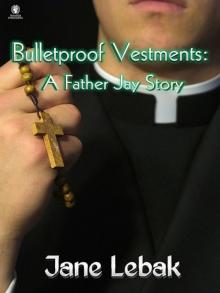 Bulletproof Vestments
Bulletproof Vestments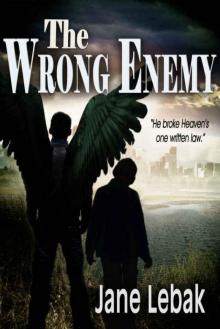 The Wrong Enemy
The Wrong Enemy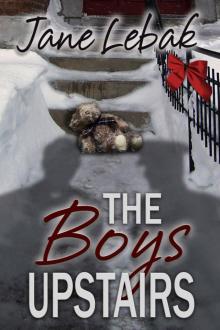 The Boys Upstairs (Father Jay Book 2)
The Boys Upstairs (Father Jay Book 2)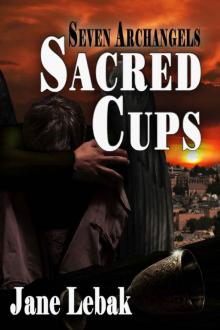 Sacred Cups (Seven Archangels Book 2)
Sacred Cups (Seven Archangels Book 2)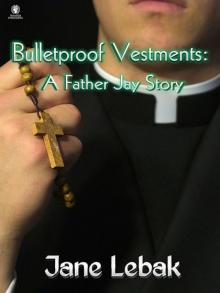 Bulletproof Vestments: A Father Jay Story
Bulletproof Vestments: A Father Jay Story An Arrow In Flight (Seven Archangels Book 1)
An Arrow In Flight (Seven Archangels Book 1)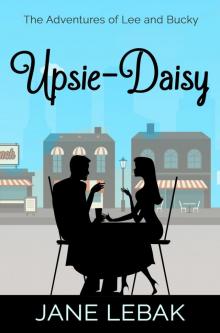 Upsie-Daisy
Upsie-Daisy Shattered Walls (Seven Archangels Book 3)
Shattered Walls (Seven Archangels Book 3) Pickup Notes
Pickup Notes